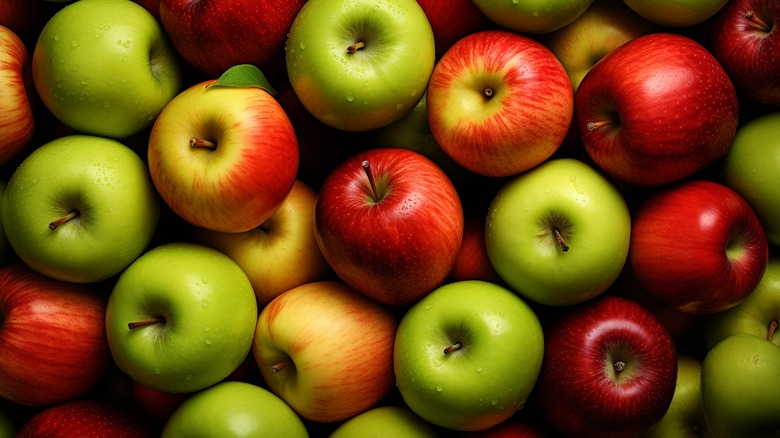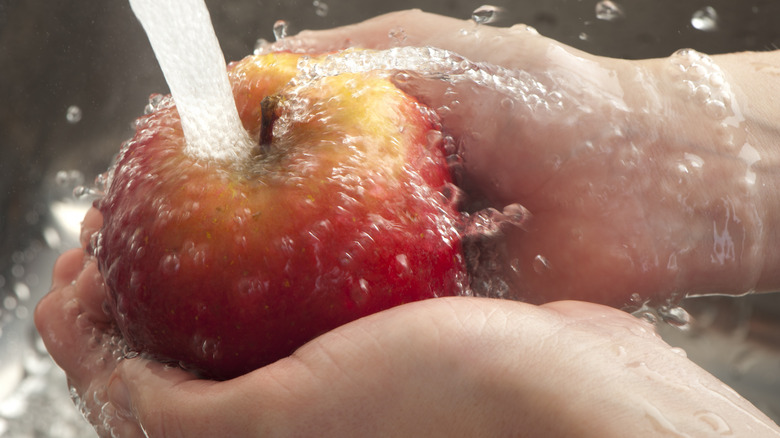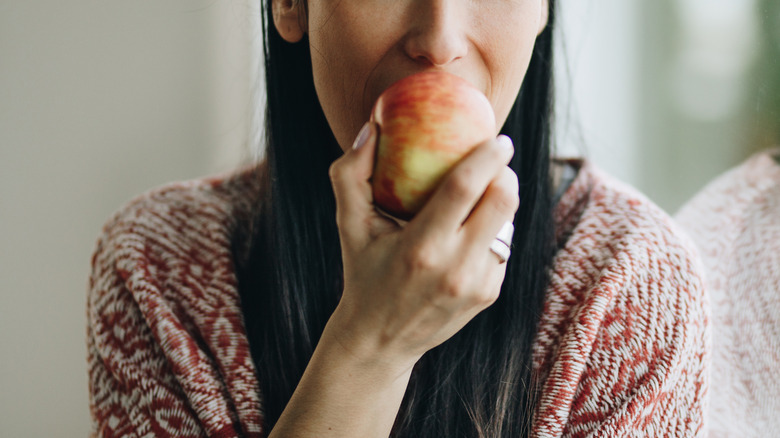How To Clean Apples If You Prefer Them Skin-On
Apples are good for much more than just pies, cobblers, and crumbles. From hearty bowls of nutty carrot and apple soup and sweet and crispy apple Dutch babies to bite-sized cinnamon apple-baked doughnuts, their applications are as unending as they are sweet. Of course, you could also just enjoy them the old-fashioned way — sliced into juicy wedges and dunked into a heaping mound of creamy peanut butter. But, if you plan on eating apples with their skin on, just be sure to give them a good cleaning first by washing them with water and baking soda.
As the saying goes, one bad apple can spoil the bunch — especially if it's not cleaned, apparently. However, giving your apple a quick wipe-down on your shirt before taking a generous bite won't suffice. That's because even though apple peels are chock-full of good-for-you vitamins and nutrients, the fruit is actually known for containing the most pesticide residues, according to the Harvard T.H. Chan School of Public Health. Moreover, the potential of dirt, bacteria, and other icky germs residing on your fruit is even more reason to give them a vigorous scrub down before you eat them.
Wash your apples with water and baking soda
When it comes to ridding your apples of pesticides and other unappetizing surface residues, the FDA widely recommends washing produce under running water. However, a 2017 study published in the Journal of Agricultural and Food Chemistry found that rinsing apples in water and baking soda is actually more effective at washing away pesticides than using tap water alone.
During the study, researchers exposed apples to large amounts of two common pesticides, thiabendazole and phosmet, for 24 hours. After testing various cleaning methods, including the use of a Clorox bleach solution, they discovered that cleaning the fruit with the simple, 1% baking soda solution was beneficial for removing virtually all of both types of pesticides after rinsing them for 12 and 15 minutes, respectively. (It's important to note that the cleaning solution was not effective at removing pesticides that had seeped through the apple peels.)
Although it's generally advised that you shouldn't soak fruit in water because it allows for the spread of germs, in this case, a thorough soaking will do. Since it can take longer for the pesticides to break down, the Harvard T.H. Chan School of Public Health recommends soaking your apples in a mixture of two cups of water and one teaspoon of baking soda for about 15 minutes before rinsing the solution away with more water and thoroughly patting them dry.
Wash your apples when you're ready to eat them
Overall, peeling your apples is really the only way to ensure that the vast majority of pesticides are removed from the fruit. But either way, whether you choose to peel them or enjoy them with the skin on, washing your apples is an absolute necessity. However, it may be a good idea to wait until you're about to eat them before you give your fruit a good rinsing. The water can actually seep past the apple's peel and accelerate the rate of decay, causing it to rot or go bad faster. For this very same reason, drying your apples off completely after washing them is also essential.
Instead of scrubbing the fruit down the second you get home from the grocery store (or unpack your Instacart order), just be sure to properly store them instead — ideally in the crisper drawer of your fridge. This can help extend their lifespan, allowing them to last for about six to eight weeks. Alternatively, you can also store your apples on your kitchen counter — a good idea if they're unripe — where they'll be good for about one to two weeks.



